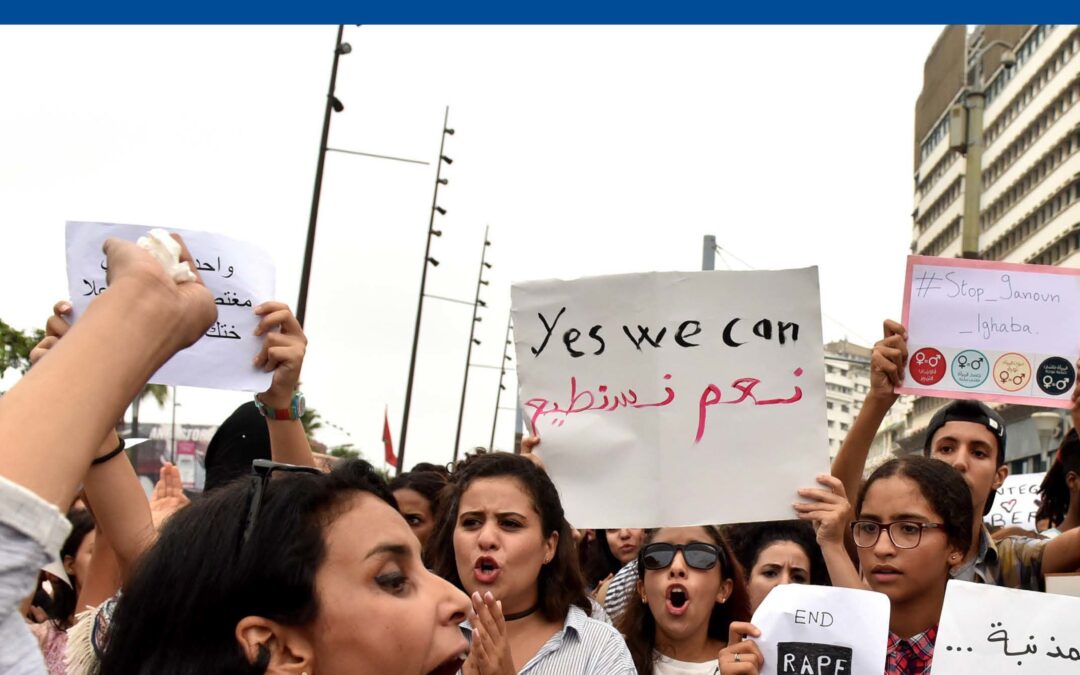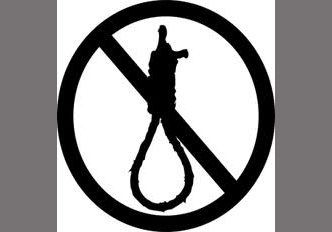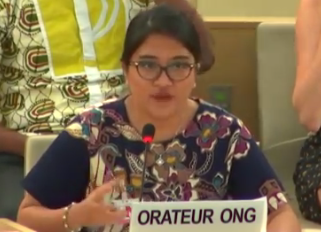
Jun 28, 2019 | Nouvelles, Publications, Rapports
Dans un rapport publié aujourd’hui à Rabat, la CIJ a appelé à l’élimination et à l’éradication des obstacles légaux et attitudes judiciaires discriminatoires entravant l’habilité des femmes et des jeunes filles à demander justice et réparation pour violences sexuelles et basées sur le genre au Maroc.
Le rapport de la CIJ Obstacles to Women’s and Girls’ Access to Justice for Gender-based Violence in Morocco (disponible en anglais et en arabe seulement) explore les différents obstacles auxquels sont confrontées les femmes qui cherchent à obtenir justice au Maroc, et adresse des recommandations au Gouvernement et au pouvoir judiciaire marocains afin d’améliorer l’accès à la justice et à des voies de recours utiles pour les femmes et jeunes filles victimes de violences sexuelles et basées sur le genre.
« Les autorités marocaines devraient modifier la Loi 103/03 et le Code Pénal afin d’assurer leur conformité au droit et aux normes internationales relatives aux droits de l’homme. Le parquet et les autorités judiciaires marocaines, dont le Conseil Supérieur du Pouvoir Judiciaire, devraient assurer que des directives détaillées concernant l’enquête et la poursuite des crimes de violences sexuelles et basées sur le genre soient développées et respectées, et que des programmes de sensibilisation soient déployés afin de lutter contre les stéréotypes de genre et le blâme des victimes dans les procédures judiciaires », a déclaré Saïd Benarbia, Directeur du Programme Moyen-Orient et Afrique du Nord de la CIJ.
Malgré la récente adoption de la Loi 103/03 relative à la lutte contre les violences envers les femmes, la violence sexuelle et basée sur le genre n’a pas encore été correctement adressée; elle reste très répandue au Maroc et nuit profondément aux droits des victimes et à la société dans son ensemble.
La Loi 103/03 ne définit pas le viol de manière conforme au droit et aux normes internationales pertinentes: le crime est encore considéré au regard de la moralité et de la décence publique, plutôt qu’en tant que violation de l’intégrité physique et de l’autonomie corporelle d’une personne; la Loi 103/13 est également une opportunité manquée de criminaliser le mariage précoce et d’un enfant, soutenant cette pratique néfaste.
En plus de lois et procédures discriminatoires, au Maroc, les femmes et jeunes filles cherchant à ce que justice leur soit rendue pour les violences sexuelles et basées sur le genre dont elles ont été victimes doivent faire face à un système judiciaire souvent influencé par des présomptions biaisées, et qui véhicule des stéréotypes de genre négatifs, dont des normes culturelles ancrées dans le patriarcat.
Dans ce contexte, comme analysé dans le rapport de la CIJ, des peines excessivement clémentes – par exemple dans les affaires de viol conjugal – et les risques accrus pour femmes et jeunes filles d’être poursuivies en justice sur la base de relations extra-conjugales consentantes dissuadent femmes et jeunes filles de demander justice et réparation pour abus physiques et sexuels dont elle ont été victimes soit des mains de leur époux soit d’individus auxquels elles ne sont pas mariées.
Afin de commencer à adresser les obstacles à l’accès à la justice rencontrés par les femmes et jeunes filles victimes de violences sexuelles et basées sur le genre, le rapport invite les autorités marocaines à :
- Adopter une législation qui reconnaît le droit individuel à l’autonomie sexuelle, et qui reconnait qu’une relation égalitaire exige le libre et entier consentement des deux parties ;
- Définir de manière adéquate et criminaliser dans toutes ses formes et selon une définition neutre sur le plan du genre les actes de viol, y compris en criminalisant le viol conjugal comme une infraction autonome ;
- Abroger l’article 490 du Code Pénal selon lequel les relations sexuelles extra-conjugales constituent une infraction pénale, et assurer que l’article 19 du Code de la Famille concernant l’âge minimal requis pour se marier soit strictement respecté ;
- Promulguer des politiques, mesures législatives et procédurales ayant pour but d’améliorer l’efficacité du système judiciaire ainsi que des autres services du secteur public liés à l’accès à la justice pour les femmes, y compris en faisant appliquer les décisions concernant les pensions alimentaires au conjoint ou aux enfants, en fournissant une assistance juridique gratuite pour les victimes de violences sexuelles et basées sur le genre, en octroyant des ordonnances de protection et en adoptant toutes autres mesures urgentes ;
- Développer et appliquer des directives portant sur l’enquête et la poursuite de crimes de violences sexuelles et basées sur le genre;
- Développer un protocole national relatif aux examens médicaux et médico-légaux dans des cas de violences sexuelles et basées sur le genre, et garantir un service d’analyses médico-légales disponible et abordable ;
- Fournir des programmes de formation et de sensibilisation visant à combattre, au sein du pouvoir judiciaire, les stéréotypes, le blâme des victimes et autres pratiques néfastes;
Informations supplémentaires
Cette semaine à Rabat, une délégation de la CIJ dirigée par la Commissaire Martine Comte a présenté le rapport à plusieurs autorités marocaines, ainsi que des acteurs de la justice et de la société civile afin de discuter de se conclusions et recommandations. La délégation de la CIJ a rencontré M. Mohamed Aujjar, Ministre de la Justice ; M. Taoufik El Maimouni, Président de la Commission Justice, Législation et Droits de l’Homme à la Chambre des députés ; M. Larbi Tabit, Secrétaire Général au Ministère de la Solidarité, de la Femme et du Développement Social ; Mme Amina Bouayach, Présidente du Conseil National des Droits de l’Homme ; ainsi que des représentants du pouvoir judiciaire et de la société civile.
Morocco-Obstacles GBV-Publications-Reports-Thematic report-2019-ENG (rapport en anglais, PDF)
Morocco-Obstacles GBV-Publications-Reports-Thematic report-2019-ARA (rapport en arabe, PDF)

Jun 28, 2019 | News
The ICJ categorically condemns Sri Lankan President Maithripala Sirisena’s endorsement of death warrants of four people convicted of drug-related offences.
Today, the ICJ urged the President to stop the imminent execution of these four convicts and to respect the de facto moratorium Sri Lanka has observed on capital punishment that over the past 43 years.
The ICJ has called on Sri Lanka to move toward full abolition of the abhorrent practice.
“President Sirisena’s resolve to resume executions would be a violation of Sri Lanka’s obligations under international human rights law and a disastrous for human rights in the country. It is also inconsistent with the global trend towards the abolition of the death penalty,” said Frederick Rawski, ICJ’s Asia-Pacific Director.
Speaking to the media on Wednesday June 26, President Sirisena announced that four execution warrants of those convicted of drug offences had been signed and that the dates for the execution had also been determined.
Those dates were left unspecified. With 1299 people on death row, the lives of at least 46 more prisoners, whose execution warrants have been prepared, are now under imminent threat.
Sri Lanka is a party to the International Covenant on Civil and Political Rights, under which it is not permitted to impose the death penalty for drug offences, the resumption of the death penalty after an extended is also incompatible with the ICCPR.
The ICJ opposes the death penalty in all circumstances without exception. The death penalty constitutes a violation of the right to life and the right not to be subjected to cruel, inhuman or degrading punishment.
The UN General Assembly has adopted repeated resolutions, most recently in December 2018, by overwhelming majority in calling for all retentionist States to observe an immediate moratorium with a view to abolition.
Sri Lanka voted in favour of a moratorium on the use of the death penalty in the 2018 UN GA Resolution.
The ICJ urgently calls on the Government of Sri Lanka to immediately halt all plans for execution and to do away with the capital punishment once and for all in keeping with its own commitment before the UN General Assembly for a global moratorium on the use of death penalty.
Instead of resuming executions, the Sri Lankan authorities should focus on effective, evidence-based approaches to crime prevention in manners that conform to international human rights law and standards.
Background
The UN Human Rights Committee, the supervisory body for the ICCPR, has made it clear that the imposition of the death penalty for crimes that are not of extreme gravity involving intentional killing, such as “drug offences” is incompatible with the Covenant as such offences do not meet the threshold of “most serious crimes”.
It has affirmed that that States parties that are not yet totally abolitionist should be on an irrevocable path towards complete eradication of the death penalty, de facto and de jure, in the foreseeable future.
The death penalty cannot be reconciled with full respect for the right to life, and abolition of the death penalty is both desirable and necessary for the enhancement of human dignity and progressive development of human rights.
It is contrary to the object and purpose of article 6 for States parties to take steps to increase de facto the rate and extent in which they resort to the death penalty, or to reduce the number of pardons and commutations they grant.
Contact
Frederick Rawski, ICJ Asia Pacific Region Director, e: frederick.rawski(a)icj.org, t: +66 644781121

Jun 27, 2019 | Advocacy, Non-legal submissions
The ICJ highlighted the role of women in ensuring respect for human rights in relation to businesses, in a statement to the UN Human Rights Council today.
In an oral statement made during an interactive dialogue with the Working Group on Discrimination Against Women and the Working Group on the issue of human rights and transnational corporations and other business enterprises, the ICJ stated as follows (check against delivery):
The International Commission of Jurists (ICJ) welcomes the report of the Working Group on the issue of human rights and transnational corporations and other business enterprises, and agrees that despite years of progress, women continue to experience multiple forms of discrimination. Women’s voices continue to be unheard and they face insurmountable challenges as they use these voices to access justice on behalf of their communities.
We have seen numerous cases where women lead their communities in protesting abuses committed by business enterprises. Many of these communities are located in remote areas, far from courts or other mechanisms that could be used by them to seek justice. The women who lead these communities often do not identify as women human rights defenders. They see themselves as mothers protecting the health of their families or the land from which they grow their food and earn their living. Because of where these communities are located, local government authorities play a significant role on whether or not these women are heard or are able to access justice.
The women farmers of Kendeng in Indonesia, for instance, have been protesting the operation of a cement factory in their area, which contaminate their water and land. In 2016, the Supreme Court of Indonesia had already ruled in favor of these women farmers and their community, and ordered the revocation of the cement factory’s permit. To this day, however, the cement factory continues to operate, ignoring the final order of the Supreme Court. The Kendeng women farmers have raised the non-implementation of the Supreme Court’s order with the Governor of Central Java and the Indonesian government, but their voices remain unheard.
In the Philippines, the women community leaders of Pio V. Corpus, Masbate, have been protesting plans to establish a cement factory and a coal-fired power plant in their town. They allege that their local government leaders approved plans for this factory and power plant without consultation and in blatant disregard of the disastrous impact these would have on the environment and people’s health.
Mr. President, we join the Working Group in urging States and business enterprises to ensure meaningful participation of potentially affected women in all stages of human rights due diligence. We also urge States to take measures to ensure that women – wherever they may be located – are able to access justice for abuses committed by business. Finally, we recommend that local government authorities be made aware of the Guiding Principles and able to integrate the gender framework and guidance in discharging their human rights responsibilities.
Thank you.

Jun 25, 2019 | News, Publications, Reports
Colombia’s transitional justice tribunal, the Special Jurisdiction for Peace (JEP in its Spanish acronym) has made progress in fighting impunity, but can do more to address the needs and demands of victims of the country’s long civil war, the ICJ said in a report released in Bogota today.
The report Jurisdicción Especial para la Paz: análisis a un año de su entrada en funcionamiento (available only in Spanish) will be presented by a high-level mission composed of the President of the ICJ, Prof Robert Goldman (former President of Inter-American Commission on Human Rights), the Vice President of the ICJ, Carlos Ayala (former President of the Inter-American Commission on Human Rights), and ICJ Commissioner Philippe Texier, former judge of the Court of Cassation of France.
The commissioners will meet with different Colombian authorities including the President of Colombia, Iván Duque Márquez, and the President of the JEP, Patricia Linares Prieto.
They will also meet with victims and other members of civil society.
The JEP is charged with prosecuting and punishing gross violations of human rights and serious violations of international humanitarian law committed during the country’s civil war.
The JEP was established by the Peace Agreement entered into between the Colombian government and the former armed group FARC-EP, on November 24 of 2016.
“The JEP has made progress in guaranteeing victims’ rights and fighting impunity for gross violations of human rights and serious violations of international humanitarian law,” said Prof Robert Goldman, ICJ’s President.
“But the JEP must do more to strengthen the effective participation of victims in its procedures, as well as to guarantee victims’ rights to justice and full reparation in compliance with international standards,” he added.
Accordingly, the report identifies ways by which the JEP can achieve these goals.
The ICJ also expresses concern about security threats faced by human rights defenders and victims and witnesses appearing before the JEP. The ICJ urges the JEP and other Colombian public authorities to adopt effective measures to guarantee their safety.
The ICJ also considers it is necessary to ensure respect for the judicial independence of the JEP against external pressures to ensure the proper performance of its functions.
The report describes the findings of a mission carried out by ICJ Commissioners Carlos Ayala, Wilder Tayler and Philippe Texier in January 2019. The report includes an analysis of the main actions and decisions taken by the JEP as well as relevant decisions of other public authorities. It reflects developments up to June 7, 2019.

Jun 25, 2019 | Comunicados de prensa, Informes, Noticias, Publicaciones
La Jurisdicción Especial para la Paz (JEP) es el tribunal de justicia transicional diseñado por el Acuerdo Final de Paz suscrito entre el Gobierno Colombiano y la guerrilla de las FARC-EP, con el fin de investigar y sancionar las graves violaciones a los derechos humanos y al derecho internacional humanitario cometidas en el conflicto colombiano.
En Bogotá, durante la semana del 24 de junio de 2019, será presentado el informe Jurisdicción Especial para la Paz, análisis a un año y medio de su entrada en funcionamiento, por una misión de alto nivel compuesta por el Presidente de la CIJ, Robert Goldman, el Vicepresidente de la CIJ, Carlos Ayala, y el comisionado de la CIJ Philippe Texier, ex juez de la Corte de Casación de Francia.
Para ello, se reunirán con diferentes autoridades colombianas incluidas, el Presidente de Colombia, Iván Duque Márquez y la Presidenta de la JEP, Patricia Linares Prieto. También se reunirán con víctimas y otros miembros de la sociedad civil.
En el informe “la CIJ reconoce los avances realizados por la JEP para garantizar los derechos de las víctimas y combatir la impunidad de las graves violaciones a los derechos humanos y del derecho internacional humanitario”, señala el profesor Robert Goldman, Presidente de la CIJ.
Al mismo tiempo, el profesor Goldman advierte que “la JEP debe avanzar en la adopción de acciones concretas para fortalecer la participación efectiva de las víctimas en sus procedimientos, así como para garantizar su derecho a la justicia y a la reparación integral, conforme a los estándares internacionales”.
Asimismo, la CIJ expresa preocupación por la situación de seguridad que enfrentan las víctimas y los testigos que comparecen ante la JEP. Por ello, exhorta a que la JEP y las demás autoridades competentes para que adopten medidas efectivas que garanticen su seguridad dentro de los trámites de la Jurisdicción.
En esa línea, la CIJ resalta en el documento que, aunque la JEP enfrenta varios desafíos y todavía tiene un largo camino que recorrer, es una institución fundamental para la consolidación de la paz en Colombia. En ese sentido, desde una perspectiva crítica pero propositiva, el informe ofrece insumos para que la JEP fortalezca y desarrolle sus funciones con plena observancia de los estándares internacionales, en particular respecto de los derechos de las víctimas y la sanción efectiva de los responsables.
Por otra parte, en el informe también se concluye que no son necesarias reformas legislativas al marco jurídico de la JEP; sino que solo es necesario que la JEP realice una interpretación de su normativa encaminada a desarrollar, profundizar e implementar, de mejor manera, los derechos de las víctimas, conforme con los estándares internacionales.
Por último, la CIJ también considera esencial que se garantice la independencia judicial de la JEP frente a presiones externas para asegurar el correcto ejercicio de sus funciones.
El informe presenta los hallazgos encontrados por una misión de la CIJ integrada por los comisionados Carlos Ayala, Wilder Tayler y Philippe Texier, la cual se realizó en enero de 2019. Estos hallazgos fueron ampliados y complementados con un análisis de las principales actuaciones realizadas por la JEP, así como, con un seguimiento a las actuaciones desarrolladas por otras autoridades.
La fecha de corte del informe es el 7 de junio de 2019.
Colombia-Jurisd para la paz-PUBLICATIONS-Reports-Fact-finding mission report-2019-SPA (Informe en PDF)









